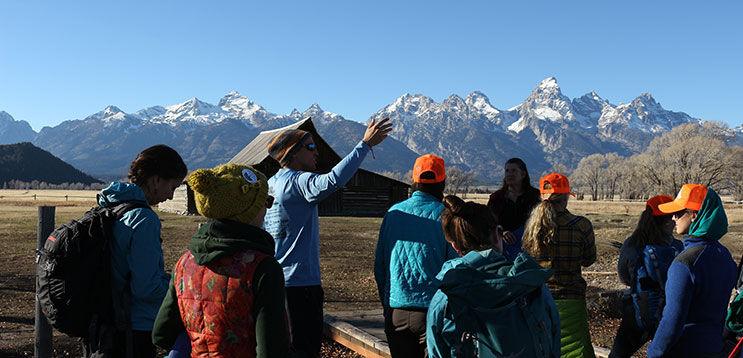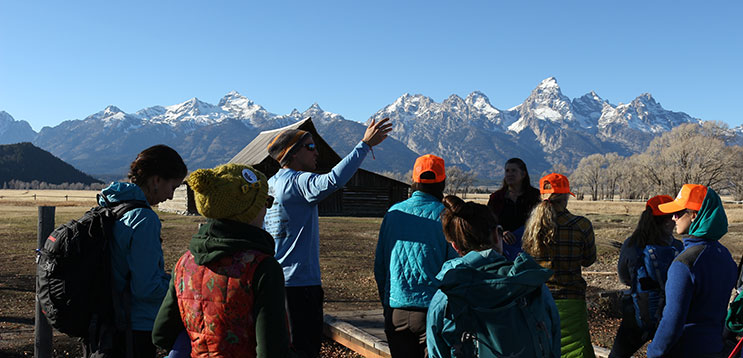Editor’s Note: DJ Sandler is an alumnus of Teton Science Schools Field Education programs and is spending the fall with us as a program and marketing intern before he starts his freshman year at Tufts University in Boston, Massachusetts.
Although I was only recently introduced to the phrase place-based education through my work at the Teton Science Schools, this month’s SHIFT Festival impassioned me as to its importance. Over the past two years, SHIFT, an environmental conference dedicated broadly to public lands protection, has cultivated a partnership with Teton Science Schools through its Emerging Leaders Program (ELP). The ELP brings in young environmental leaders from all over the United States to talk through conservation related issues and to revitalize the next generation of the conservation movement by making it relevant to all Americans. Many of these emerging leaders among other guests at the SHIFT conference emphasized the importance of preparing today’s youth for jobs in outdoor recreation by bringing them into the field. These ideas are similarly aligned with the mission of the Teton Science Schools. For Teton Science Schools, place-based education means taking curriculum outside of the classroom to increase student engagement, improve learner outcomes and positively impact the community.
 The importance of place-based education is obvious to me. My years in middle school were spent looking for tracks in the woods of Ripton, Vermont and climbing in the Green Mountains. I had the privilege of having a quintessential place-based-education.I hadn’t expected that SHIFT and Teton Science Schools would put such a strong emphasis on the importance of place-based education because I thought of its practice as commonplace. As I listened to SHIFT speakers throughout the week, I began to realize they were describing the benefits of place-based education for minorities in urban areas, a demographic that differs greatly from my peer group. I am very aware of privilege from an economic standpoint, but through SHIFT I came to understand how fortunate I am to have access to a variety of outdoor activities. The week helped me realize that environmental issues and economic issues are intrinsically interconnected. Introducing the benefits of public lands to groups without previous access to outdoor recreation expands the base of the environmental movement. Spending more time outside also provides an outlet to escape from the stresses of everyday life, even if they don’t have immediate access to public lands.
The importance of place-based education is obvious to me. My years in middle school were spent looking for tracks in the woods of Ripton, Vermont and climbing in the Green Mountains. I had the privilege of having a quintessential place-based-education.I hadn’t expected that SHIFT and Teton Science Schools would put such a strong emphasis on the importance of place-based education because I thought of its practice as commonplace. As I listened to SHIFT speakers throughout the week, I began to realize they were describing the benefits of place-based education for minorities in urban areas, a demographic that differs greatly from my peer group. I am very aware of privilege from an economic standpoint, but through SHIFT I came to understand how fortunate I am to have access to a variety of outdoor activities. The week helped me realize that environmental issues and economic issues are intrinsically interconnected. Introducing the benefits of public lands to groups without previous access to outdoor recreation expands the base of the environmental movement. Spending more time outside also provides an outlet to escape from the stresses of everyday life, even if they don’t have immediate access to public lands.

Looking back on my experiences at Teton Science Schools, I see that they were able to implement place-based education seamlessly. I attended Teton Science Schools’ Field Ecology program when I was in seventh and eighth grade. This program was the embodiment of place-based education, giving students a variety of lessons, all outdoors in the shadow of the Grand Teton. While some of the kids I spent my time with were from environments similar to my own, the vast majority were from places completely foreign to me. During the ten days I spent on the Kelly Campus, I became best friends with a fellow camper from Mexico, shared a bunk with a Montanan, and slept in a tent with kids from San Diego and Baltimore. Our homes became trivial facts as we all experienced the majesty of the Tetons together. Without understanding the intricacies of place-based education, I felt like I was a part of something significant just being a part of this diverse group. Now that I have returned to Teton Science Schools, I’m excited to see a variety of similarly diverse groups, some who are lucky enough to have regular access to the outdoors and many of whom have never seen anything quite like the Tetons. Being there to see students experience looming mountains, deep layers of snow, and an abundance of wild flora and fauna possibly for the first time is an incredible opportunity and one I look forward to sharing over the coming weeks.


